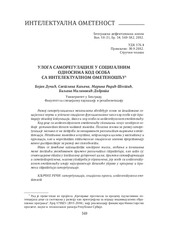Приказ основних података о документу
The role of self-regulation in social relations of persons with intellectual disabilities
Uloga samoregulacije u socijalnim odnosima kod osoba sa intelektualnom ometenošću
| dc.creator | Dučić, Bojan | |
| dc.creator | Kaljača, Svetlana | |
| dc.creator | Radić-Šestić, Marina | |
| dc.creator | Milanović-Dobrota, Biljana | |
| dc.date.accessioned | 2021-06-09T13:51:47Z | |
| dc.date.available | 2021-06-09T13:51:47Z | |
| dc.date.issued | 2012 | |
| dc.identifier.issn | 0354-8759 | |
| dc.identifier.uri | http://rfasper.fasper.bg.ac.rs/handle/123456789/645 | |
| dc.description.abstract | Development of self-regulation mechanisms provides the basis for following social norms and successful functioning both of persons belonging to the general population and persons with intellectual disabilities. In children with intellectual disabilities the external locus of control remains dominant across the lifespan. The starting point for self-regulation development is based on necessity to master different aspects of competencies. Negative life experiences, inappropriate goals in upbringing and education and lack of optimal social challenges, represent the important distracters in development of this skill. Although the increase of capacity to control thoughts, emotions and behavior can be achieved through the practice of different strategies, such as: sequencing of stages when attaining long-term goals, application of selfaffirmation and self-instruction, their use is limited, since the most difficulties encountered by the persons with intellectual disabilities are exactly the difficulties in creating and applying self-regulatory strategies. | en |
| dc.description.abstract | Razvoj samoregulacionih mehanizama obezbeđuje osnov za poštovanje socijalnih normi i uspešno socijalno funkcionisanje kako kod osoba koje pripadaju opštoj populaciji, tako i kod osoba sa inteletualnom ometenošću. Kod dece sa intelektualnom ometenošću spoljašnji lokus kontrole ostaje dominantan tokom čitavog života. Polazna osnova za razvoj samoregulacije zasniva se na potrebi za ovladavanjem različitim vidovima kompetencija. Negativna životna iskustva, neprikladni ciljevi u vaspitanju i edukaciji, kao i nedostatak optimalnih socijalnih izazova predstavljaju važne distraktore za razvoj ove sposobnosti. Ipak se povećanje kapaciteta kontrole misli, osećanja i ponašanja može postići uvežbavanjem primene različitih strategija, kao što su: sekvenciranje etapa u postizanju dugoročnog cilja, primena samoafirmacija i samopotkrepljenja, njihova upotreba je ograničena, jer osobe sa intelektualnom ometenošću imaju najizraženije teškoće upravo u kreiranju i primeni strategija samoregulacije. | sr |
| dc.publisher | Univerzitet u Beogradu - Fakultet za specijalnu edukaciju i rehabilitaciju, Beograd | |
| dc.publisher | Društvo defektologa | |
| dc.relation | info:eu-repo/grantAgreement/MESTD/Basic Research (BR or ON)/179025/RS// | |
| dc.rights | openAccess | |
| dc.rights.uri | https://creativecommons.org/licenses/by-sa/4.0/ | |
| dc.source | Beogradska defektološka škola | |
| dc.subject | self-regulation | en |
| dc.subject | social relations | en |
| dc.subject | intellectual disabilities | en |
| dc.subject | samoregulacija | sr |
| dc.subject | socijalni odnosi | sr |
| dc.subject | intelektualna ometenost | sr |
| dc.title | The role of self-regulation in social relations of persons with intellectual disabilities | en |
| dc.title | Uloga samoregulacije u socijalnim odnosima kod osoba sa intelektualnom ometenošću | sr |
| dc.type | article | |
| dc.rights.license | BY-SA | |
| dc.citation.epage | 582 | |
| dc.citation.issue | 3 | |
| dc.citation.other | (3): 569-582 | |
| dc.citation.rank | M52 | |
| dc.citation.spage | 569 | |
| dc.identifier.fulltext | http://rfasper.fasper.bg.ac.rs/bitstream/id/569/642.pdf | |
| dc.identifier.rcub | https://hdl.handle.net/21.15107/rcub_rfasper_645 | |
| dc.type.version | publishedVersion |


